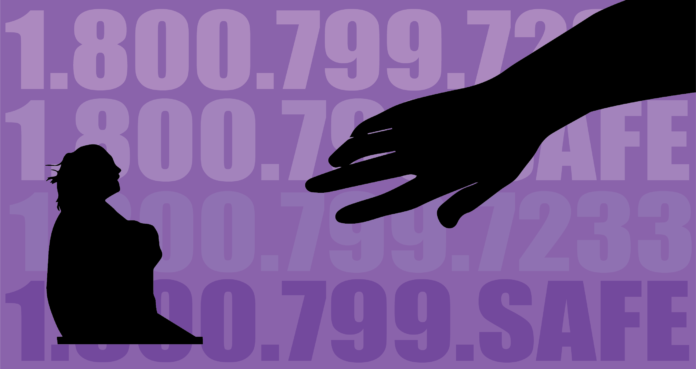CONTENT WARNING: This story contains mentions of domestic violence, abuse and suicide. Use caution before reading.
Domestic violence can occur in many different forms in any relationship. Maizee Zaccone the Outreach and Volunteer Advocate for Victim Outreach Intervention Center (VOICe) is one of the many supports for survivors who are reaching out for help.
The priority for VOICe is to offer a safe place for survivors of domestic violence with various resources. This includes things such as crisis intervention, emergency shelter, transitional housing, advocacy-based counseling, various advocate serious and support groups as well as community outreach and prevention, according to their website.
Zaccone describes domestic violence as any type of abusive relationship falling under the category of intimate partner or a romantic relationship of some kind.
“Domestic violence can be from physical abuse, to emotional abuse, which can be a little more difficult to identify,” Zaccone said. “There can be manipulation, coercion, blackmail. It can be economic abuse, keeping your partner from having a job of their own . . . access to documents, to treatment.
“It’s a wide spectrum.”
Relationships that fall under abuse, manipulation or coercion are defining traits of domestic violence.
VOICe serves those in Butler Country, making it a direct resource for Slippery Rock University (SRU) students. According to their “Who We Serve” message, they provide services to those in the community regardless of age, gender, race, color, religion, culture, national origin, sexual orientation and many more.
The organization has two very prominent services they utilize. One of these services is their 24 hour hotline, which can be reached at 1.800.400.8551. VOICe also has a domestic violence shelter which allows survivors to stay for roughly 30 days. They are provided with the basic necessities such as food, clothes and similar items.
“It gives survivors the opportunity to have that disconnected time from whatever is going on in their life and be able to decide what’s next,” Zaccone said. “Unfortunately, that ends up in them returning to whatever situation they were already in.
“On average, it takes about seven times for somebody to leave an abusive relationship.”
Amanda Reilly, a senior SRU student, openly spoke on her Instagram (@theamandareilly) about a previous abusive relationship she was in for nearly two years.
Her post cites multiple incidents over the years including things such as being belittled, called various names, being yelled at as well as sexual coercion. Reilly began to distance herself once she realized the situation she was in.
“It was a cycle that I felt stuck in and never thought it would end until one day it finally did,” Reilly wrote in her multi-slide Instagram post. “Even now almost a year later, I’m still struggling with the trauma while he’s living with no remorse, and that’s something I will have to learn to be okay with.”
As Reilly processed what happened, she often turned to her friends for support. That support quickly made her more open to discuss this with others.
“I’m very lucky that my friends have a great way of communicating,” Reilly said. “It really helped me to eventually talk to my mom and dad about it.
“It started with one friend, then to a group of friends, then one day I was able to talk to my parents as briefly as I could.”
Going to Instagram to share personal details can sometimes be a daunting experience, but for Reilly she did it “arm in arm” with a close friend. Negative backlash was a fear for her, but the post actually prompted a young woman to reach out to Reilly and share details of her current experience.
“It can be anyone you know or anyone you pass,” Reilly said. “It’s sad because it really can be anyone.”
While domestic violence is often considered a “women’s issue,” VOICe is working towards reframing the narrative around abuse.
“We as a society haven’t caught up with the fact that not all relationships are heteronormative.” Zaccone said. “We haven’t caught up with, you know, that toxic masculinity is an issue.
“Men being willing to even say that they could be a victim is an issue.”
Zaccone pushes the importance of recognizing that men are also affected by domestic violence.
In 2014 an investigation began that involved two teenagers and domestic violence. Michelle Carter and Conrad Roy III had been involved with each other since 2012. According to a New York Times article, Carter refereed to Roy as her boyfriend, but he seemed to reject that idea.
Roy had struggled with abuse at home and thoughts of suicide prior to the incident occurring on July 12, 2014. As time went on, Carter had been encouraged him to go through with it. The case has various sides to the conversation, often times people defending Carter.
The case aides in conversation regarding abuse, specifically when men are the victim.
It is important to have these conversations regarding domestic violence, but Zaccone also thinks it’s important to learn and recognize what a healthy relationship is. This includes having boundaries, respect and saying “I’m worth it.”
“There can be a more optimistic side of the conversation, too,” Zaccone said.
VOICe offers many local resources for those in the SRU area, but there is also a national hotline available (1.800.799.7233).








